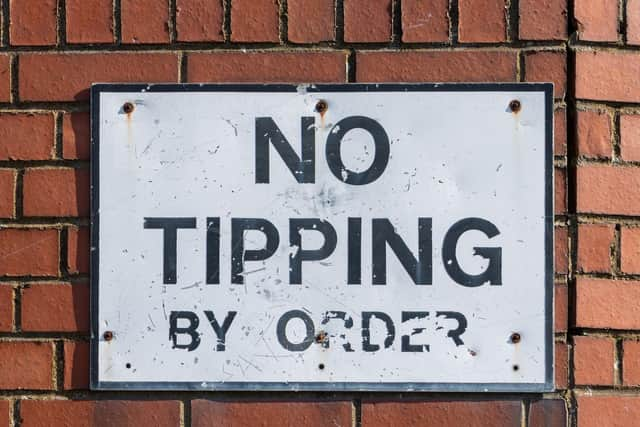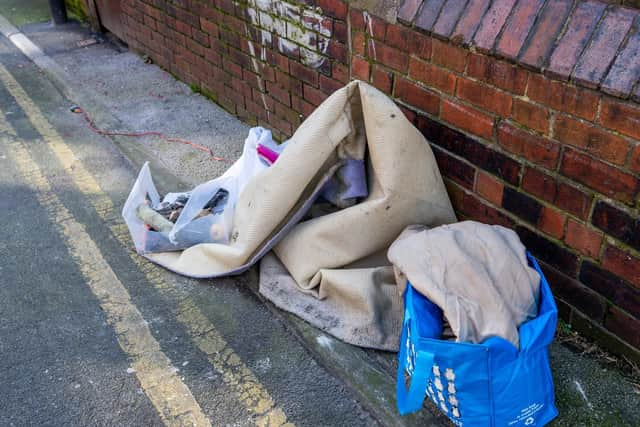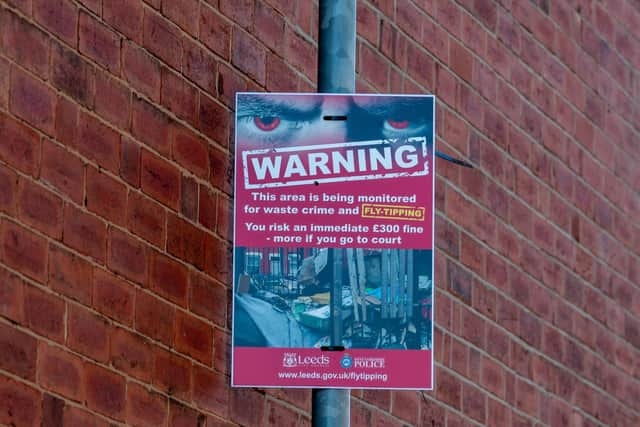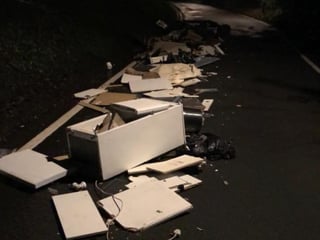Leeds Council spends nearly £1million clearing fly-tipping - but only makes £1,600 in fines
and live on Freeview channel 276
The local authority spent £1,500 on prosecution actions costs, which means the council actually only recouped £100.
Analysis shows that out of 32,411 incidents logged for 2018-19, 127 fixed penalty notices were actioned and three prosecution made. However, 73 of those fines were paid.
Increase in incidents


Advertisement
Hide AdAdvertisement
Hide AdFly-tipping appears to be a growing problem with the number of incidents being reported to Leeds City Council increasing nearly three-fold over the last five years.
In 2013-14 there were 11,341 registered incidents; 14,445 for 2014-15; 16,036 for 2015-16; 16,805 for 2016-17 and a surge of more than 10,000 for 2017-18 to 27,215.
For 2018-19, the council changed the way it recorded the clearing up costs, basing it upon ‘tipper load clearance costs’ and ‘significant clearance costs’. That being the case, then the data shows it cost £507,650 and £436,950 respectively amounting to £944,600.
The types of fly-tipping incidents logged include rubbish dumped on highways, footpaths, railways, farmland and watercourses.


Advertisement
Hide AdAdvertisement
Hide AdLatest figures come as the YEP is shining a light on public authority statistics, as part of our Your Right to Know campaign.
The items illegally discarded include materials such as fridges and freezers, tyres, oil drums, asbestos and vehicle parts as well as 54 animal carcasses.
Epidemic
The campaign group, Keep Britain Tidy, said that fly-tipping had become an “epidemic”.


“Our research shows that less than half of people understand that they can be prosecuted, and end up with a criminal record, if they pay someone to take away their waste who subsequently fly-tips it.
Advertisement
Hide AdAdvertisement
Hide Ad“A third of people also think that it’s OK to do things that are, legally, classed as fly-tipping so #CrimeNotToCare is vital step in trying to turn the tide on the fly-tipping epidemic that is costing our country millions of pounds to clean up.”
Rising Costs
The costs of investigating incidents has risen dramatically compared to five years ago. In 2014-15 there were more than 50 per cent less incidents reported compared to the most recent figures. Investigation costs were £459,855 and resulted in 131 fixed penalty notices.
In 2015-16 there were 16,036 incidents costing £512,523 to investigate and 124 FPNs. 2016-17 saw 16,806 incidents and 48 FPNs at a cost of £542,025.
From 2017 onwards Leeds City Council changed the way it recorded the investigation costs and they became logged as clearance costs and prosecution costs.
Advertisement
Hide AdAdvertisement
Hide AdThe Environment Agency says it is local authorities that have the powers to deal with fly-tipping offences and can issue on-the-spot fines to fly-tippers and to stop, search and seize vehicles suspected of being used for fly-tipping.
Local authorities and the Environment Agency are also able to issue penalties of up to £400 to householders who do not pass their waste to a licensed carrier and whose waste is then found fly-tipped.
It added that nationally, local authorities carried out 2,397 prosecutions for fly-tipping offences in 2018/19, an increase of seven per cent on 2017/18; over 96 per cent of prosecutions resulted in conviction.
The number of fixed penalty notices issued has continued to increase, up 11 per cent to 76,000 from 2017/18.
Council
Advertisement
Hide AdAdvertisement
Hide AdA spokesperson for Leeds City Council said: “Leeds takes the issue of waste crime very seriously, understands the blight it can put on people’s communities, and seeks to do all it can to educate residents about the correct ways to dispose of waste as well of prosecuting those who continue to handle and dump waste illegally and for profit.
“In Leeds, our teams also fully report all instances of waste crime (which isn’t the case for all councils) and higher incident numbers have also been recognised by Defra as belonging to those councils which use the latest reporting methods and which are being more pro-active and rigorous in identifying incidents.
“We do have a strong track record of prosecuting criminals and seizing assets of those who continue to handle and dump waste illegally and for profit.
“However, we also recognise that prosecution is just one tool at our disposal in tackling waste crime, and have recently invested significant resources into a number of new initiatives designed to increase face to face engagement and outreach in relation to environmental behaviour change. We have developed local waste-crime actions plans which seek to educate and inform the public about the impact illegally dumping waste can have on our communities as well as the legal consequences for perpetrators.
Advertisement
Hide AdAdvertisement
Hide Ad“This has included recruiting new street wardens in priority areas to deter waste crime and raise awareness of alternatives e.g. donating to charity and increased community engagement through ‘Community Clear-Up’ days that help residents love where they live by taking care about containing their waste and reporting any illegal fly tipping. In the longer term, we are confident this will be a more sustainable and proactive way of reducing fly-tipping than relying on enforcement action alone.”
A spokesperson for the Environment Agency added: “Waste crime is an unacceptable blight on our environment, estimated to cost the UK economy at least £600m a year.
“We are determined to bring waste criminals to justice, which is why anyone found guilty could face jail time or a hefty fine. In the last year, we closed down over 900 illegal waste sites, brought forward 113 prosecutions and launched a Joint Unit for Waste Crime to bring down the most serious and organised criminal groups.”
Comment Guidelines
National World encourages reader discussion on our stories. User feedback, insights and back-and-forth exchanges add a rich layer of context to reporting. Please review our Community Guidelines before commenting.
